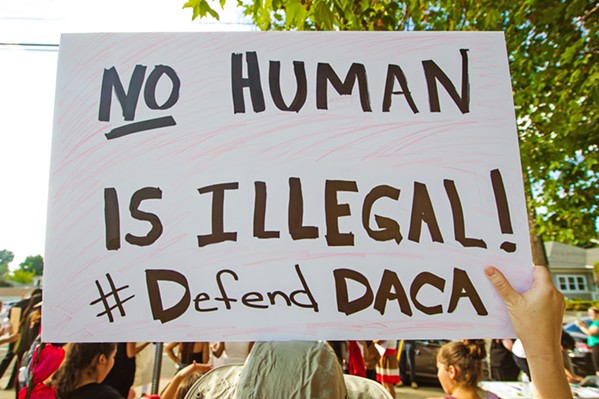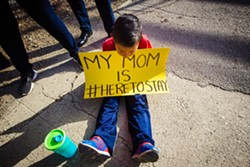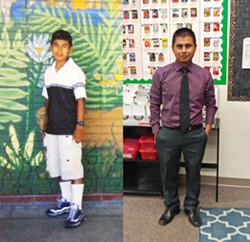Supporting dreams
After Trump's announcement to end DACA, program recipients and locals step forward to support the undocumented community
By Karen Garcia[{
"name": "Newsletter Promo",
"id": "NewsletterPromo",
"class": "inlineCenter",
"insertPoint": "4",
"component": "15264767",
"requiredCountToDisplay": "0"
},{
"name": "Ad - Medium Rectangle CC01 - 300x250",
"id": "AdMediumRectangleCC01300x250",
"class": "inlineCenter",
"insertPoint": "8",
"component": "2963441",
"requiredCountToDisplay": "12"
},{
"name": "Ad - Medium Rectangle LC01 - 300x250",
"id": "AdMediumRectangleCC01300x250",
"class": "inlineCenter",
"insertPoint": "18",
"component": "2963441",
"requiredCountToDisplay": "22"
},{
"name": "Ad - Medium Rectangle LC09 - 300x250",
"id": "AdMediumRectangleLC09300x250",
"class": "inlineCenter",
"insertPoint": "28",
"component": "3252660",
"requiredCountToDisplay": "32"
}]
The earliest memories Erik Garcia has of growing up in California are of living in Oakland and then later in Modesto. He remembers going to flea markets where his dad had a stand selling a number of goods.
"We tried to have our own business, but obviously like with most businesses there are hit and misses, but that was what we could do to support ourselves," Garcia said.
He is now in his 20s and a student at Cal Poly, about to begin a journey that follows a version of the American dream, just like everyone else. But unlike many, Garcia carries around a label you can't see simply by looking at him. He's an undocumented immigrant, and until he was in college, it wasn't something he was very open about.
Now, Garcia is sharing his immigration status on the heels of President Donald Trump administration's announcement to end the Deferred Action for Childhood Arrivals (DACA) program.
In 2012, then-President Barack Obama signed an executive order that created DACA, allowing certain young undocumented immigrants brought to this country before the age of 16 to apply for two-year work permits—that could be renewed indefinitely. Another requirement for eligibility is to be enrolled in school, graduated, or obtaining a certification of completion from high school or a GED. While the program was created to protect those young people from deportation, it did not create a path to citizenship.
DACA also worked as a complement to the California Dream Act, a state law that enables undocumented students to apply for and receive private scholarships, state financial aid, university grants, and community college fee waivers.
But on Sept. 5, the Trump administration said it would phase out DACA and no longer accept new DACA applications. Congress must now find a replacement for the program, to codify the legal protections for its recipients. The bill proposed to take its place is the DREAM Act, or the Development Relief and Education of Alien Minors Act. If passed, this federal law would create a path to legal residency for undocumented youth.
Local U.S. Rep. Salud Carbajal (D-Santa Barbara), from California's 24th Congressional District, is calling on Congress for an immediate vote on the proposed law by signing a discharge petition. Carbajal said that he and others are signing the petition in the hope that they can collect signatures from 218 members of Congress, which will force a vote on the act.
"The DREAM Act has been passed by the Senate in previous Congresses in a bipartisan way, and the House hasn't been able to move forward with it," he told New Times.
Until Congress walks down that path, though, Garcia and the other 800,000 young undocumented immigrants currently estimated to have been DACA recipients nationwide are left in limbo. According to the Migration Policy Institute, out of the 379,000 immigrants immediately eligible for DACA in California, about 2,000 reside in San Luis Obispo County.
While many DACA students are now uncertain about what the future holds, a handful of Central Coast residents, organizations, and educational institutions have rallied behind them by protesting, sharing their personal stories, and offering support.
Defending your status
Garcia and his family left Sain Alto Zacatecas, Mexico, when he was just a year old. But his status wasn't something that he shared with his fellow classmates or anyone until recently.
"Whenever you disclose your immigration status it's almost like you have to defend yourself, 'I came here because of this or that,' and you never knew how someone would react," he said.
As a teenager, when Garcia finally understood what his immigration status meant, he felt ashamed.
"In high school you're so impressionable that you think you're going to be outted because you're 'illegal.' That was the word they used," Garcia said.
But many factors in his life gave Garcia the encouragement to get to his educational finish line, which is graduating college, and he was quick to give credit to his family members for their help.
"Like any parents, they've always told me that they wanted what's best for me and that's why they've made the choices that they have," Garcia said.
But his biggest source of encouragement is his older brother, who wasn't fortunate enough to have an opportunity to benefit from a program like DACA. Garcia said that his brother had applied to a university in Arizona to pursue an education in aerospace engineering.
"They made him go through so many hoops just to go to the school. They even went as far as saying they would allow him to attend the school, but they would have to report him to immigration," Garcia said.
His brother's inability to go to college pushed Garcia to figure out how he could attend university some day. The DACA program was put into place while Garcia was in community college so he used it to continue his educational path at Cal Poly, where he is currently completing his last quarter.
He will be graduating with a double major in history and political science and will be the first in his family to earn a college degree.
"The five years that we [DACA students] have been given with this program, we have done right by this country and we have shown that we can do a lot for this country," he said.
New DACA applications are no longer being accepted, but current permit holders were allowed to renew their permits one more time by Oct. 5—if their current permit expires before March 5, 2018.
Garcia was one of the lucky ones, able to renew his permit for two more years under the DACA program.
When he has his diploma, he's hoping to apply his knowledge to local government. But figuring out the future isn't as clear as it once was.
"When you're planning a career in advance, two years isn't enough. You want to plan out maybe five or 10 years down the line, but we're kind of back to living before DACA, just day to day," he said.
Different perspectives
Near the courtyard in front of the Cultural and Performing Arts Center on the Cuesta College campus in SLO, the smell of refried beans, rice, and chicken fajitas wafted in the air.
The college hosted a resource fair, "Sharing the Dream," on Sept. 22 to inform students, faculty, and the community about resources that are available to DACA recipients and undocumented immigrants as well as to show their support of this population.
Carol Jones was sitting on a bench with her husband, eating a plate of food. She attended the event because she's unsure and afraid of what's going to happen to many people in her community, so she wants to become more informed. One of many reasons this topic is important to Jones is that when her family was in a time of need, an undocumented immigrant from El Salvador was there to help.
"It always makes me cry when I tell this story, but I had a woman come to my door and ask for work." After losing her husband in a car accident and needing to support her children, the woman came to Jones' home. "She helped me raise my daughter when I had to go back to work to help support my family," Jones said as she wiped away a tear.
That's the whole point of the event, said Que Dang, director of student equity and success at Cuesta.
"We're sending a message to our students, their families, and our community that everyone is welcome here," Dang said. "We care about their success, and we don't care about their immigration status."
In the corner of Dang's office window is a sticker that reads "campus ally for undocumented students." It's a sign to students, so they know that if they have questions or concerns about DACA, they can ask them in her office with the promise of complete confidentiality.
Dang said she has a personal investment in being an ally to immigrants because she was a refugee from Vietnam and understands the struggle of coming to a new country for a better life. After the Vietnam War, Dang and her family traveled to the United States when she was just 3 years old. But she said the political climate was different then, and the U.S. was more open to immigrants.
"My parents didn't speak English, didn't have money, and I literally witnessed what it was for people to help us and to have a government that was very welcoming," Dang said.
She and her three brothers all have college degrees and well-paying jobs because government support was available in the form of sponsorships and job training. Dang said she is constantly thinking about students today, who are growing up without the same kind of safety net or cultural support that she had.
"They're in a different place and their road is much bumpier than mine, but I can see what happens when we open our country to support immigrants and refugees," she said. "I'm a product of that."
Despite the recent news and the uncertainty that Dang sees in students, she said the activism and support that has come out of the struggles surrounding DACA and its recipients has been huge.
"People are really using their voices to advocate for their communities. I see a lot of folks from all over the county who don't have to worry about their immigration status but they're there supporting our students and I think that's inspiring," Dang said.
Supporting the dream
Standing at a podium in front of his Santa Maria office in September, Rep. Carbajal urged his fellow members of Congress to pass legislation to protect DACA recipients.
"Right now, nearly 1 million young people are unfairly living with great uncertainty about their future. The 800,000 patriotic young dreamers in communities across the country including thousands on the Central Coast are Americans in every way except on paper," Carbajal said.
Alba Rodriguez, of Santa Maria, was among the many faces calling for action, supporting the program, or sharing personal stories that day in front of Carbajal's office. Taking her position at the podium, Rodriguez shared the story of her daughter, a student at Pioneer Valley High School in Santa Maria.
Rodriguez brought her daughter to the U.S. from Baja California when her daughter was just 10 months old. She spoke to New Times in Spanish, saying that when she was growing up, she didn't have a chance to pursue an education because her father was a single parent and couldn't afford to send her to school.
"I came here because I was thinking of a better future for my children and an education that my dad couldn't give me. I didn't want to repeat my story with my children; I want them to be educated and to have a better life," she said.
For more than 25 years, Rodriguez has worked in the fields from sunrise to sunset, picking strawberries and blueberries to support her family.
"I don't feel bad about working in the fields, because it's what I can do and I'm doing something good in this country," she said.
Although she works hard to make a living, it's not the kind of job that she wants her daughter to have.
"But I tell my daughter we should be thankful to God that we are in this country that has blessed us with food, jobs, a home, and opportunities," she said.
Rodriguez's daughter, a DACA recipient, is currently ranked in the top 20 academic achievers at Pioneer Valley.
"When we found out about DACA, it was exciting news for all of us. It was like a light inside of a dark tunnel for my daughter and I," she said.
Now Rodriquez's daughter is currently in her senior year and is applying to colleges with the hopes of becoming a veterinarian. She was able to renew her application with DACA for two more years, but it's what happens beyond those two years that she and her mother are worried about.
"It fills my heart with sadness to know that my daughter, who has a lot of dreams to continue her education at a university, has an uncertain future," Rodriguez said.
It's a constant topic of conversation in Rodriguez's house. She said her daughter has become concerned about being deported because the government received all of her personal information when she applied for DACA. Rodriguez said she has to stay strong for her daughter and continue to encourage her to move forward in this difficult time.
"I tell her, 'You have been doing everything right, and we have to have faith in God. Whatever happens you are going to continue your education,'" she said.
Attending community, school, and local meetings on the subject gives Rodriguez some peace of mind that she is well informed on what's happening with DACA. It also gives her the strength to offer encouragement to other parents of DACA recipients.
"I want to feel strong and have the right information when I meet someone that has children who are DACA recipients, so I can encourage them and tell them not to worry, because this will have a happy ending and there will be a future for our children," she said.
Sharing encouragement
At a young age, Lucio Casiano helped his mother in the fields picking strawberries. He remembers the hard work that they did together to support themselves.
Casiano immigrated to the U.S. in 2000 from Oaxaca, Mexico, but he was so young that his experience of traveling across the desert felt like a fun adventure.
"I remember walking with our guide, in front of him or even holding his hand. My poor mom, she was in back walking as fast if she could because if immigration caught us we could possibly be separated," he said.
Casiano and his mother went straight to Santa Maria from Mexico and stayed in the area, but starting a new life wasn't easy. He remembers a time when they lived in a garage with one bed, looked for dinner in the trash when they couldn't afford food, and hardly had enough clothing to wear. In junior high, he owned one pair of pants and two shirts that his mom would wash immediately after school so he could have clean clothes for the next day.
Seeing his mom working in the fields every day, rain or shine, motivated Casiano to step it up and better his and his mother's lives.
"One day, my mom put a strawberry picking cart and a backpack in front of me and said, 'Choose. Whatever you choose, I'll support you,'" he said.
Picking up the backpack, he chose to go back to school. After three years of working in the fields alongside his mom, Casiano enrolled at Allan Hancock College in Santa Maria.
He's now 29 years old and graduated from Cal Poly with the support of his mother and DACA. He currently works for the Santa Maria Joint Union High School District as a bilingual instructional aide.
"I see a lot of students who don't have hope, because they think college is impossible, but that's why I share my story with them—to encourage them," Casiano said.
He said he wants to demonstrate that if someone like him, who didn't speak English and had nothing, could be successful, then so can anyone else with limitations similar to his. Even though the future of the DACA program is up in the air, Casiano is remaining positive that there will be some type of support for young undocumented immigrants.
"If one door closes, another will open, it's just a matter of wanting to succeed in life," he said.
A welcoming city
As elected officials in the nation's capital struggle with what to do about DACA now that Trump has announced the program will end, California waits for Gov. Jerry Brown to put his signature on two bills that would make the state and college campuses act as sanctuary sites.
Senate Bill 54, also known as the California Values Act, would restrict how state and local law enforcement notify and work with federal immigration authorities when illegal immigrants are arrested and taken into custody. In a similar vein, Assembly Bill 21, or Access to Higher Education for Every Student, ensures that universities and community colleges keep students' immigration status confidential and gives students access to financial aid, legal representation, and their constitutional right to due process. Both bills are currently being considered by the governor, who has until Oct. 15 to sign them into law.
Locally, 35th District Assemblyman Jordan Cunningham (R-Templeton) spoke against the bill in the state Assembly in early September.
"In my view the bill's going to make us less safe," Cunningham said. "It's going to protect the criminal at the expense of the law-abiding citizen."
Cunningham's opposition sparked a small group of Cal Poly students and clubs—Cal Poly Democrats, Cal Poly MEXA, Cal Poly Queer Student Union, Cal Poly Students for Quality Education, and The Student Collective—to protest at his SLO office in September.
They loudly made their point chanting, "Jordan, listen! Sanctuary for all!" and, "Say it loud, say it clear, immigrants are welcomed here!"
Sophia Rosales, a recent Cal Poly graduate, was among the protesters, saying she was there because she thought it was better for people to express their opinions rather than do nothing. The negative emotions that Rosales perceives are being directed at immigrants are troubling, but she said that's why she uses her voice.
"Just doing something such as getting together and rallying is a bigger step than a city that doesn't," Rosales said. "We need to speak out about it and show them why this is important for students. They are Americans; they have no other home but America."
She said she has very close friends who are undocumented, and it's hard for her to see them being treated like outsiders.
"It's sad hearing people telling them that they don't belong here. No human should be told that they don't belong," she said.
New Times reached out to Cunningham for comment, but he did not respond by press time.
SLO Mayor Heidi Harmon said Cunningham is in the minority of the state Legislature, so his stance possibly won't have a huge impact on the outcome of the bills, but it does have an effect locally.
"While it may not have any real substantive policy effect, it exacerbates the confusion and the fear that the immigrant community is feeling," Harmon said.
In early April, the SLO City Council voted unanimously on a "welcome city" resolution. Regardless of an immigrant's legal status, the city has decided to welcome them with open arms, but the resolution stops short of declaring SLO a sanctuary city—that could make it ineligible for federal funding.
"My colleagues and I think the vast majority of the rest of the community in San Luis Obispo is really interested in being as welcoming and supportive as possible of all people," Harmon said.
She said that by passing the resolution as a city, it was a way to make it clear to the undocumented community that they are welcomed and supported.
"It's incumbent upon us to take a stand on basically the attack on human dignity that's happening right now," Harmon said. Δ
Staff Writer Karen Garcia can be reached at [email protected].
Latest in News
Comments (4)
Showing 1-4 of 4
Readers also liked…
-

Coast Unified teachers upset over new position's salary and qualifications
Oct 20, 2022 -

SLO police identify alleged driver who hit and killed couple
Dec 22, 2022 -

When the levee breaks: Oceano residents, county officials walk a tightrope of regulations to manage Arroyo Grande Creek, which some say led to the levee's failure in January
May 18, 2023











